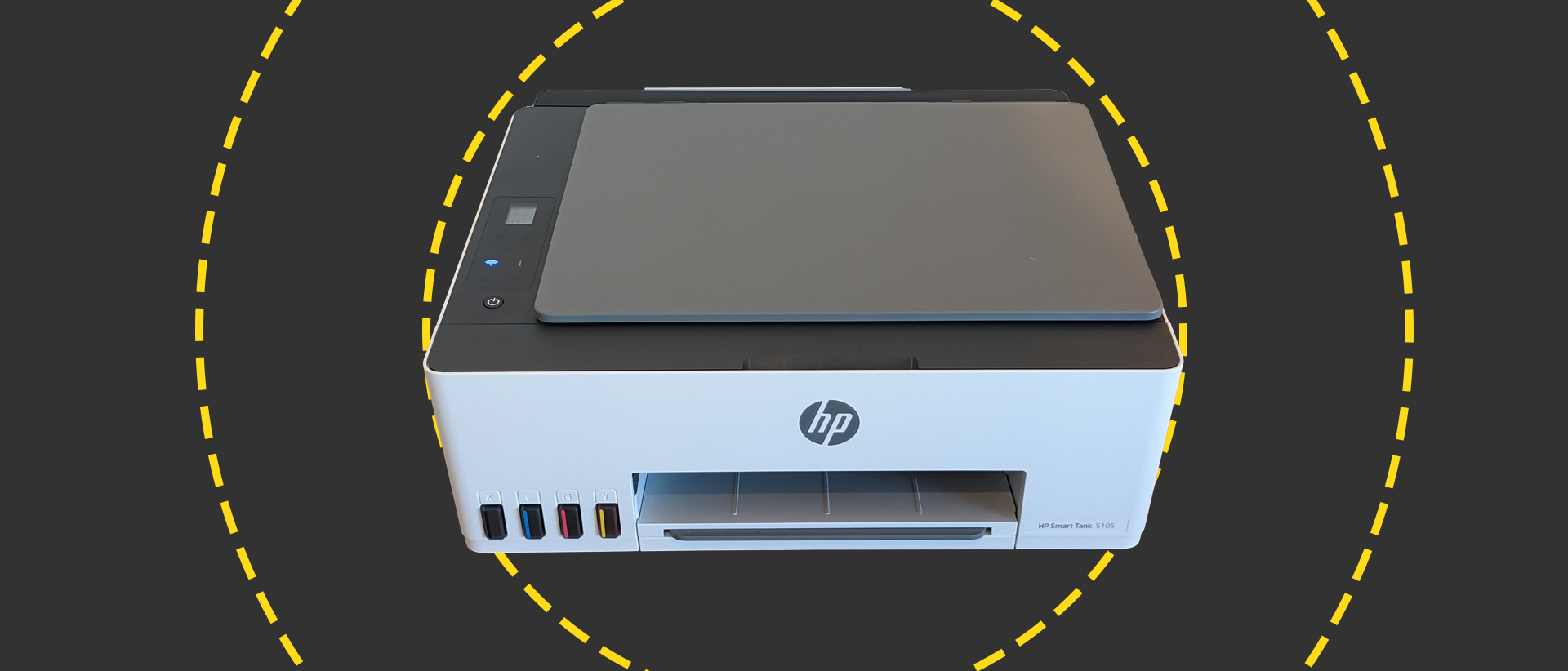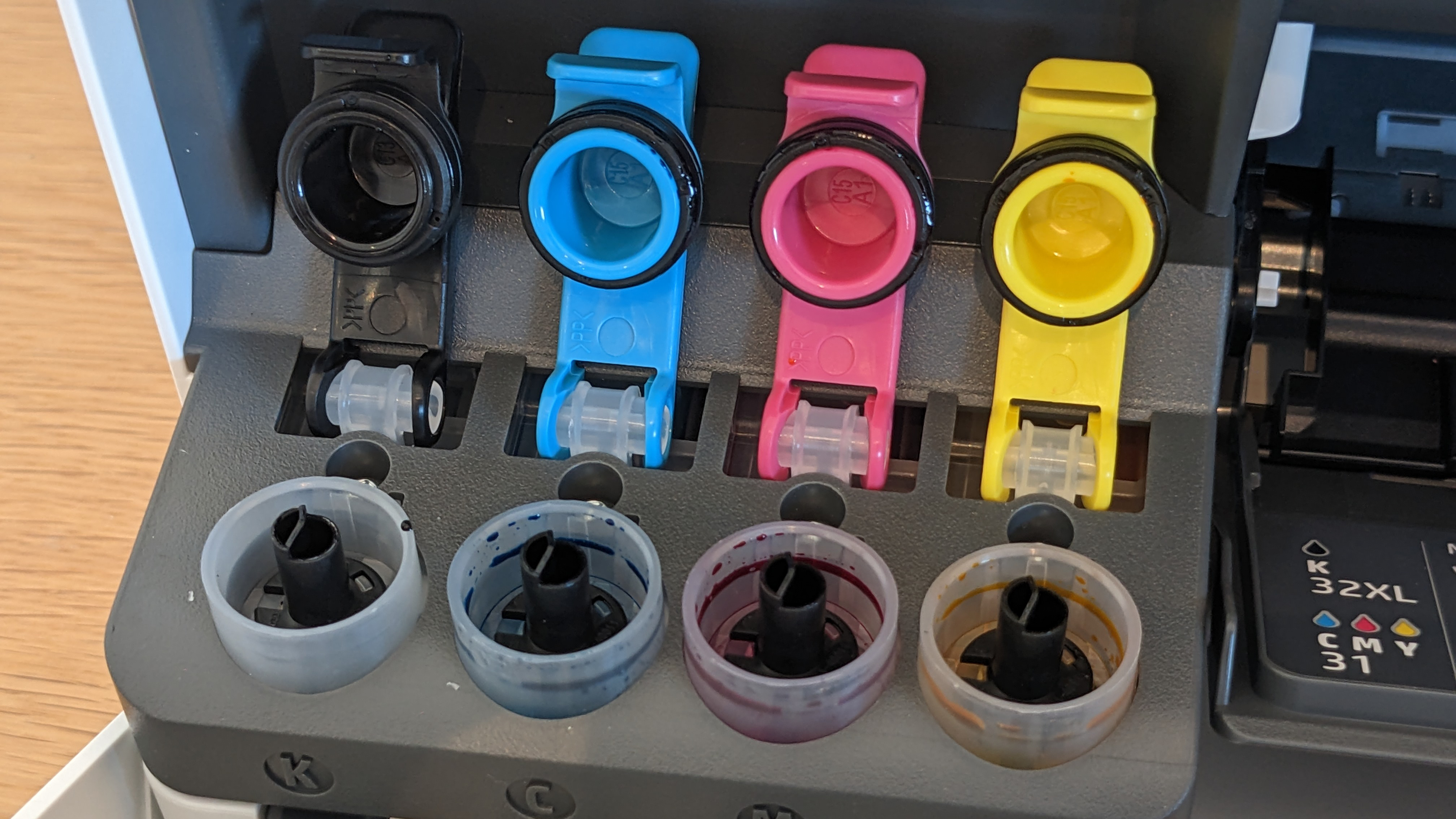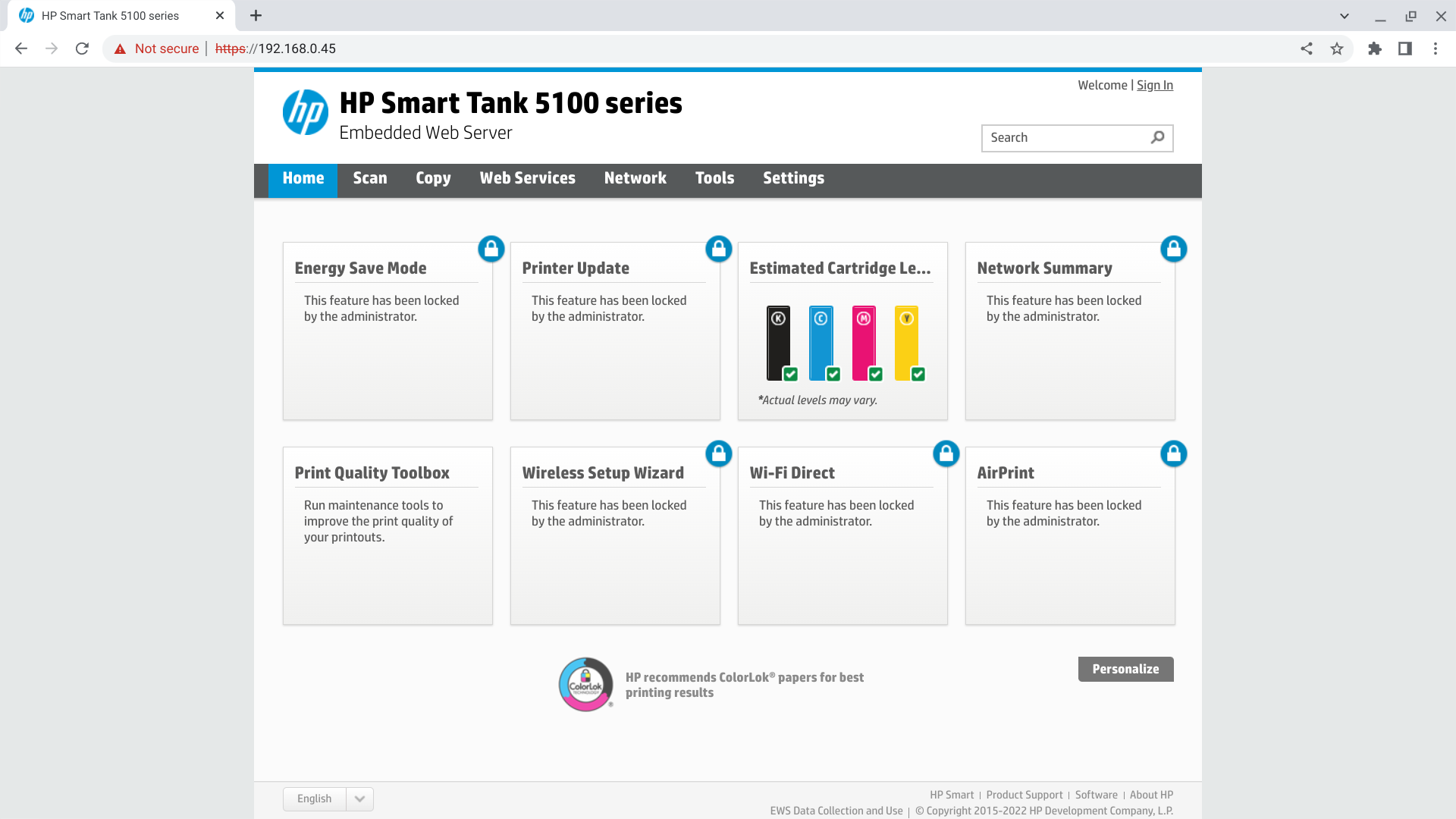HP Smart Tank 5105 review: A basic but brilliant, cheap multifunction
The HP Smart Tank 5105 is perfect, if you can handle a basic MFP, and you want cheap printing

-
+
Good quality prints
-
+
Decent scans and copies
-
+
Very low cost of ownership
- +
-
-
Comparatively expensive to buy
-
-
Slow color printing

If the HP Smart Tank 5105 is anything to go by, the Smart Tank range seem to be hitting the right notes. This is despite HP being a comparative latecomer to refillable inkjets with both Epson and Canon getting in first with their EcoTank and Megatank ranges, respectively.
This Smart Tank in particular is quite a basic multifunction peripheral (MFP). There's no fax modem, so it's limited to prints, scans and copies, and there are no niceties such as a swish colour touchscreen. What you do get is a basic 100-sheet paper input, an even more basic 30-sheet output tray, and Wi-Fi connectivity. There's a simple mono LCD display, with buttons to trigger mono and colour copies, or a print-out of the MFP's status.
HP Smart Tank 5105 review: Setting up
The Smart Tank 5105 is clearly aimed at home and home office use, and as such it's predictably easy to set up. That said, things are a bit more involved than with HP's typical cartridge-based printers. Installation involves fitting a pair of print heads - which are essentially empty cartridges – then using the supplied ink bottles to fill the four tanks ranged across the MFP's front panel.
While the EcoTank and Megatank systems both use physical keying to prevent you mis-fuelling with, say, cyan instead of magenta ink, HP's system doesn't. For this reason it's vital to pay attention and get the right colour in each tank. We encountered another hiccup when the print head carrier didn't stop in quite the right place – it needed a gentle nudge before we could fit the black head.
HP really doesn't want you to use its full suite of PC drivers, instead steering users towards the HP Smart app. There's little wrong with this, particularly when it comes to finding and configuring a new printer for a wireless network, but it's a shame you have to jump through hoops to install a conventional set of PC software. If that's what you need, the key is to search online for HP Easy Start, and decline a switch to HP Smart when the setup program prompts you.
Like most other HP printers you'll get the chance to sign up for HP+, but it's not mandatory. This printer also comes without the usual hard sell for an Instant Ink cartridge subscription. In large part this is because you won't be buying ink all that often. The 5105 arrives with enough to print around 6,000 pages and, unlike rival models, there's no initial priming process to use any of it up. Subsequent refills should last for the same number of pages, giving this printer ultra-low ongoing running costs of 0.17p per black page, or 0.6p (excluding VAT) for a full-colour page.

The Smart Tank system may lose points for its lack of colour keying, but it gains them back again as the only refillable system with ink level monitors. Anyone who's used an EcoTank printer will know the system can be paranoid about how much ink actually remains onboard, frequently cajoling the user to make visual checks.
HP Smart Tank 5105 review: Printing, scanning and copying
Interesting ink system aside, this is a fairly prosaic, near-entry level MFP. As such, we weren't expecting great things when it came to our timed tests, and we weren't disappointed. The Smart Tank 5105 delivered a first page of black text in 16 seconds, and went on to complete a 25-page document at a rate of 10.9 pages per minute (ppm). In draft mode, this edged up to 11.6ppm, quite satisfactory for this class of device.
Things were a lot less sprightly in colour, with a first page trundling out in 40 seconds. This MFP took almost 15 minutes to complete our complex colour graphics test – a rate of just 1.7ppm. With the Max DPI setting enabled, photos were positively glacial, with six borderless 10x15cm (6x4") prints inching imperceptibly out over 28 minutes. Photocopies followed a similar pattern, with a single mono page completing in a reasonable 20 seconds, but colour copies needing a tedious 53 seconds.
We're not huge fans of HP's TWAIN scan interface, but it has improved in recent years to allow a choice of 150 dots per inch (dpi), necessary for one of our timed tests. The interface works slightly differently to competing software, with a prescan – taking 11 seconds – all that's necessary to capture at low resolutions.
At 300dpi and above, the software rescans the original after the preview step just like most other TWAIN interfaces. It took 20 seconds to scan an A4 page at 300dpi, and 49 seconds to capture a 10x15cm print at a medium-high 600dpi – both inline with what we'd expect, or perhaps just slightly slower. Only at the maximum 1,200dpi was this an especially slow scanner, needing more than two and a half minutes to capture a 10x15cm photo.
HP Smart Tank 5105 review: Performance
Despite some slow performances, most users are likely to find the results worth waiting for. This MFP produces great prints on plain paper, with bold black text that looks almost laser-sharp to the naked eye. It's a good color graphics printer, too, painting bold colors without particularly obvious banding or graining.
Despite their slow gestation, photo prints weren't as impressive, suffering from slightly washed out colours in places. Our black and white test print had a subtle greenish hue – it wasn't the worst, but you wouldn't choose this printer if photo quality was of primary importance.

Similarly, this isn't the best scanner we've tested. It did a good enough job of capturing office documents, although their colours were a little desaturated when compared to the originals. Photos seemed gently underexposed and, in common with almost all HP scanners we've tested, showed evidence of digital sharpening when viewed at 100% zoom – there's no option to switch this off. Photocopies very much reflected the scanner's performance, suffering slightly from its sombre take on colours.
HP Smart Tank 5105 review: Verdict
Set aside its purchase price for a moment, because the Smart Tank 5105 is essentially a near-entry level device. Bear this in mind, and on the whole it produces decent results in a reasonable timeframe. Its strongest point is excellent plain paper quality, and its worst is very slow colour printing. Despite being basic, it's fairly easy to use and it worked reliably in all our tests.
Consider price, and the 5105 needs a little more explaining. It costs three or four times as much as we'd expect to pay for a cartridge-based equivalent, but it does arrive with 6,000 pages' worth of ink – potentially saving you around £400 before you'd even need to buy more bottles. Of course, you'll only realise those savings if you print that kind of volume, which can take a couple of years on a moderately used home device: reassuringly, HP's offering a three-year, 30,000-page warranty upgrade on registration, which ought to more than cover it.
This isn't the best MFP we've tested, and it's not quite the cheapest to run, but as an overall package HP has got the Smart Tank 5105 spot on. If you don't need fast performance and advanced features, but you're looking for a cheap, low maintenance MFP for a home or micro office, it's an excellent choice.
HP Smart Tank 5105 specifications
| Technology | Thermal inkjet |
| Maximum print resolution | 1,200x4,800dpi |
| Dimensions | 435x362x157mm |
| Weight | 5kg |
| Maximum paper size | A4/legal |
| Warranty | One year (three years with registration) |
| Print speeds | Mono speed: 10.9ppm - Mixed colour speed: 1.7ppm |
Get the ITPro daily newsletter
Sign up today and you will receive a free copy of our Future Focus 2025 report - the leading guidance on AI, cybersecurity and other IT challenges as per 700+ senior executives
After a brief career in corporate IT, Simon Handby combined his love of technology and writing when he made the move to Computer Shopper magazine. As a technology reviewer he's since tested everything from routers and switches, to smart air fryers and doorbells, and covered technology such as EVs, TVs, solar power and the singularity.
During more than 15 years as Shopper's long-time printer reviewer, Simon tried, tested and wrote up literally hundreds of home, small office and workgroup printers. He continues reviewing smart products and printers for a variety of publications, and has been an IT Pro contributor since 2010. Simon is almost never happier than when surrounded by printers and paper, applying his stopwatch and a seasoned eye to find the best performing, best value products for business users.
-
 ‘Phishing kits are a force multiplier': Cheap cyber crime kits can be bought on the dark web for less than $25 – and experts warn it’s lowering the barrier of entry for amateur hackers
‘Phishing kits are a force multiplier': Cheap cyber crime kits can be bought on the dark web for less than $25 – and experts warn it’s lowering the barrier of entry for amateur hackersNews Research from NordVPN shows phishing kits are now widely available on the dark web and via messaging apps like Telegram, and are often selling for less than $25.
By Emma Woollacott Published
-
 Redis unveils new tools for developers working on AI applications
Redis unveils new tools for developers working on AI applicationsNews Redis has announced new tools aimed at making it easier for AI developers to build applications and optimize large language model (LLM) outputs.
By Ross Kelly Published
-
 Google layoffs continue with "hundreds" cut from Chrome, Android, and Pixel teams
Google layoffs continue with "hundreds" cut from Chrome, Android, and Pixel teamsNews The tech giant's efficiency drive enters a third year with devices teams the latest target
By Bobby Hellard Published